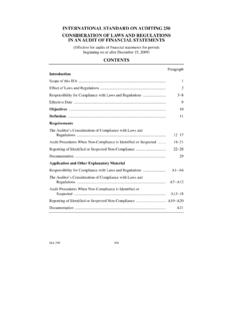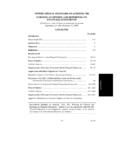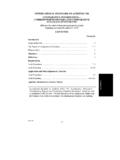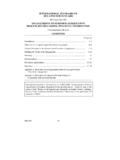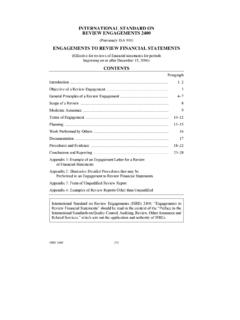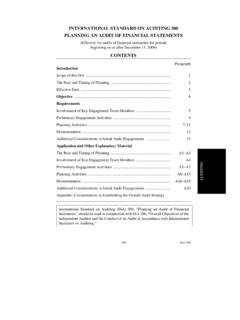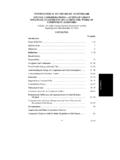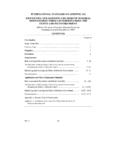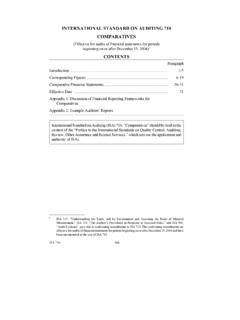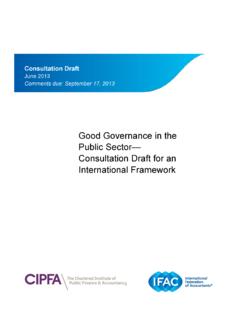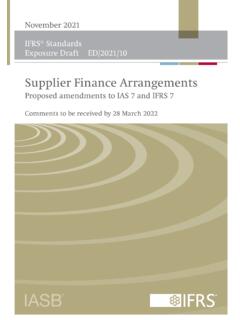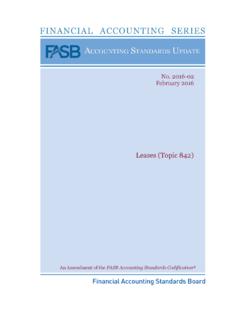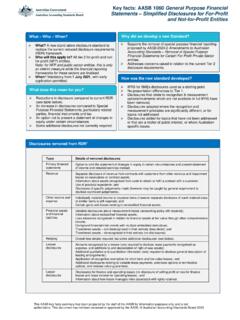Transcription of IPSAS 3—ACCOUNTING POLICIES, CHANGES IN …
1 IPSAS 3 106 IPSAS 3 ACCOUNTING POLICIES, CHANGES IN ACCOUNTING ESTIMATES AND ERRORS Acknowledgment This international Public Sector Accounting Standard ( IPSAS ) is drawn primarily from international Accounting Standard (IAS) 8 (Revised December 2003), Accounting Policies, CHANGES in Accounting Estimates and Errors published by the international Accounting standards Board (IASB). Extracts from IAS 8 are reproduced in this publication of the international Public Sector Accounting standards Board (IPSASB) of the international Federation of Accountants (IFAC) with the permission of the international Accounting standards Committee Foundation (IASCF). The approved text of the international financial reporting standards (IFRSs) is that published by IASB in the English language, and copies may be obtained directly from IASB Publications Department, 30 Cannon Street, London EC4M 6XH, United Kingdom.
2 E-mail: Internet: IFRSs, IASs, Exposure Drafts and other publications of the IASB are copyright of IASCF. IFRS, IAS, IASB, IASC, IASCF and international Accounting standards are trademarks of IASCF and should not be used without the approval of IASCF. IPSAS 3 107 PUBLIC SECTOR December 2006 IPSAS 3 ACCOUNTING POLICIES, CHANGES IN ACCOUNTING ESTIMATES AND ERRORS CONTENTS Paragraph Introduction .. IN1 20 Objective .. 1 2 Scope .. 3 6 Definitions .. 7 8 Materiality .. 8 Accounting Policies .. 9 36 Selection and Application of Accounting Policies .. 9 15 Consistency of Accounting Policies .. 16 CHANGES in Accounting Policies .. 17 23 Applying CHANGES in Accounting Policies .. 24 32 Retrospective Application .. 27 Limitations on Retrospective Application .. 28 32 Disclosure .. 33 36 CHANGES in Accounting Estimates.
3 37 45 Disclosure .. 44 45 Errors .. 46 54 Limitations on Retrospective Restatement .. 48 53 Disclosure of Prior Period Errors .. 54 Impracticability in Respect of Retrospective Application and Retrospective Restatement .. 55 58 Effective Date .. 59 60 Withdrawal of IPSAS 3 (Issued 2003) .. 61 Appendix: Amendments to Other Pronouncements Guidance on Implementing IPSAS 3 Basis for Conclusions Comparison with IAS 8 ACCOUNTING POLICIES, CHANGES IN ACCOUNTING ESTIMATES AND ERRORS IPSAS 3 108 IPSAS 3, Accounting Policies, CHANGES in Accounting Estimates and Errors is set out in paragraphs 1 61 and the Appendix. All the paragraphs have equal authority. IPSAS 3 should be read in the context of its objective and the Basis for Conclusions, and the Preface to the international Public Sector Accounting standards . ACCOUNTING POLICIES, CHANGES IN ACCOUNTING ESTIMATES AND ERRORS IPSAS 3 109 PUBLIC SECTOR Introduction IN1.
4 IPSAS 3, Accounting Policies, CHANGES in Estimates and Errors, replaces IPSAS 3, Net Surplus or Deficit for the Period, Fundamental Errors and CHANGES in Accounting Policies (issued May 2000), and should be applied for annual reporting periods beginning on or after January 1, 2008. Earlier application is encouraged. Reasons for Revising IPSAS 3 IN2. The IPSASB developed this revised IPSAS 3 as a response to the IASB s project on Improvement to international Accounting standards and its own policy to converge public sector accounting standards with private sector standards to the extent appropriate. IN3. In developing this revised IPSAS 3, the IPSASB adopted the policy of amending the IPSAS for those CHANGES made to the former IAS 8, Net Profit or Loss for the Period, Fundamental Errors and CHANGES in Accounting Policies made as a consequence of the IASB s improvements project, except where the original IPSAS had varied from the provisions of IAS 8 for a public sector specific reason; such variances are retained in this IPSAS 3 and are noted in the Comparison with IAS 8.
5 Any CHANGES to IAS 8 made subsequent to the IASB s improvements project have not been incorporated into IPSAS 3. CHANGES from Previous Requirements IN4. The main CHANGES from the previous version of IPSAS 3 are described below. Name of Standard IN5. The Standard is called Accounting Policies, CHANGES in Accounting Estimates and Errors. ScopeIN6. The Standard includes criteria for the selection of accounting policies that were previously contained in IPSAS 1, Presentation of financial Statements ; and IN7. The Standard does not contain requirements on the presentation of items in the statement of financial performance, which are now included in IPSAS 1. ACCOUNTING POLICIES, CHANGES IN ACCOUNTING ESTIMATES AND ERRORS IPSAS 3 110 Definitions IN8. The Standard defines new terms: change in accounting estimate, prior period errors, prospective application, retrospective application and retrospective restatement, impracticable, material and notes.
6 IN9. The Standard does not include definitions of the terms: extraordinary items, ordinary activities, net surplus/deficit, and surplus/deficit from ordinary activities, which are no longer required. Materiality IN10. The Standard stipulates that: The accounting policies in IPSASs need not be applied when the effect of applying them is immaterial; and financial statements do not comply with IPSASs if they contain material errors. Net Surplus or Deficit for the Period IN11. The Standard does not include the requirements for the presentation of surplus or deficit for the period that were included in the superseded IPSAS 3, these requirements are now included in IPSAS 1. Accounting Policies IN12. The Standard specifies the hierarchy of IPSASB s pronouncements, and authoritative and non-mandatory guidance, to be considered when selecting accounting policies to apply in the preparation of financial statements. The new hierarchy is now established as a principle and printed in bold type.
7 IN13. The Standard does not include the allowed alternative treatments for CHANGES in accounting policies (including voluntary CHANGES ) that were included in the superseded IPSAS 3. An entity is now required (where practicable) to account for CHANGES in accounting policies retrospectively. Errors IN14. The Standard does not distinguish between fundamental errors and other material errors. IN15. The Standard does not include the allowed alternative treatments for the correction of errors that were included in the superseded IPSAS 3. An entity is now required to correct (where practicable) material prior period errors retrospectively in the first set of financial statements authorized for issue after their discovery. ACCOUNTING POLICIES, CHANGES IN ACCOUNTING ESTIMATES AND ERRORS IPSAS 3 111 PUBLIC SECTOR Criteria for Exemptions from Requirements (Impracticability) IN16. The Standard requires that when it is impracticable to determine the cumulative effect, at the beginning of the current period, of: Applying a new accounting policy to all prior periods, or An error on all prior periods, The entity CHANGES the comparative information as if the new accounting policy had always been applied; or the error had been corrected, prospectively from the earliest date practicable.
8 IN17. The Standard includes guidance on the interpretation of impracticable. Disclosures IN18. The Standard requires more detailed and additional disclosure of the amounts of adjustments as a consequence of changing accounting policies or correcting prior period errors than was required by the superseded IPSAS 3. IN19. The Standard requires, rather than encourages the disclosure of: An impending change in accounting policy when an entity has yet to adopt a new IPSAS which has been published but not yet come into effect; and Known or reasonably estimable information relevant to assessing the possible impact that application of the new IPSAS will have on the entity s financial statements in the period of initial application. Amendments to Other Pronouncements IN20. The Standard includes an authoritative appendix of amendments to other IPSASs that are not part of the IPSASs Improvements project and will be impacted as a result of the proposals in this IPSAS .
9 ACCOUNTING POLICIES, CHANGES IN ACCOUNTING ESTIMATES AND ERRORS IPSAS 3 112 IPSAS 3 ACCOUNTING POLICIES, CHANGES IN ACCOUNTING ESTIMATES AND ERRORS Objective 1. The objective of this Standard is to prescribe the criteria for selecting and changing accounting policies, together with the accounting treatment and disclosure of CHANGES in accounting policies, CHANGES in accounting estimates and the corrections of errors. This Standard is intended to enhance the relevance and reliability of an entity s financial statements, and the comparability of those financial statements over time and with the financial statements of other entities. 2. Disclosure requirements for accounting policies, except those for CHANGES in accounting policies, are set out in IPSAS 1. Scope 3. This Standard shall be applied in selecting and applying accounting policies, and accounting for CHANGES in accounting policies, CHANGES in accounting estimates and corrections of prior period errors.
10 4. The tax effects of corrections of prior period errors and of retrospective adjustments made to apply CHANGES in accounting policies are not considered in this Standard as they are not relevant for many public sector entities. international or national accounting standards dealing with income taxes contain guidance on the treatment of tax effects. 5. This Standard applies to all public sector entities other than Government Business Enterprises. 6. The Preface to international Public Sector Accounting standards issued by the IPSASB explains that Government Business Enterprises (GBEs) apply international financial reporting standards (IFRSs) which are issued by the IASB. GBEs are defined in IPSAS 1. Definitions 7. The following terms are used in this Standard with the meanings specified: Accounting policies are the specific principles, bases, conventions, rules and practices applied by an entity in preparing and presenting financial statements.
